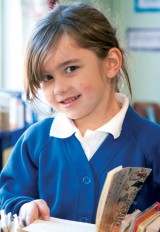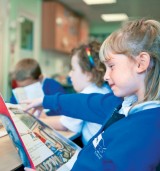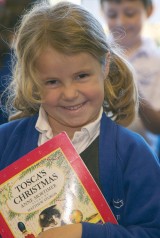Holding a story book workshop for parents will help mums, dads and carers to feel confident about developing their child's reading
Parents are the biggest advocates you have in the eternal battle of encouraging children to read. If you can gain parents’ support, then you have a better chance of capturing the child.
 As a primary school librarian, I have had many opportunities to talk to parents and most are very keen to be involved in their child’s learning. They want to read with their child and welcome the opportunity to work with them in the school environment. Not every parent, however, feels confident of the best way to go about this, which has inspired me to develop story bag workshops.
As a primary school librarian, I have had many opportunities to talk to parents and most are very keen to be involved in their child’s learning. They want to read with their child and welcome the opportunity to work with them in the school environment. Not every parent, however, feels confident of the best way to go about this, which has inspired me to develop story bag workshops.
At Hill West Primary School, we hold story bag workshops for Reception parents every year, but they could be adapted for any year group; although non-fiction does work better in KS2. Parents are invited into school to make story bags with their children, which in turn can be used as a learning tool in the classroom. The intention of the workshops is to teach parents the skills to support their child’s reading development, and to inspire them to create a reading ethos at home.
A story bag is simply a bag containing a book and related craft ideas, games and other fun activities. It allows the children to interact with the story by stimulating discussion, role-play, games and more.
Begin with the bag, or perhaps, like me, use a pillow case. Decorate the outside of the bag with the book’s title and pictures from the chosen book. I like to use felt, which I stick on with PVA glue, but you could use fabric paint/pens or, if you are handy with a needle and thread, you could sew straight on to the bag. KS2 children could design and create the bag itself for themselves. Make it bright and colourful; the more attractive it is, the more inviting it will be.
Keep things simple with a basic set of resources and activities:
• A story book
• A CD of the story (its cheaper to record this yourself)
• Finger puppets, masks or related toys to enable a retelling of the story
• Home-made jigsaws, made using a picture from the story
• A simple related game, e.g. pairs, snap or bingo
Whatever you decide, make sure the activities can be made by parents and the children.
Planning a workshop
 Give yourself plenty of time - I usually allow around four weeks - then decide on which year group you are going to target.
Give yourself plenty of time - I usually allow around four weeks - then decide on which year group you are going to target.
Meet with staff from your chosen year group to discuss the time, length and date of the workshop (e.g. to coincide with a specific topic); size of group; number of story bags to be made; books to be used; location and the objective of the workshop. This last point is very important as the emphasis of each workshop may be different depending on your parents and their needs (e.g. to encourage reluctant parents into school, or to encourage more fathers to become reading role models).
The next job is to invite the parents, not forgetting to outline the purpose of the workshop and, if necessary, specify who you want to attend, e.g. dads.
Now the initial planning is done, it’s time to organise the activities. Meet with staff from your target year group to choose a topic and a book - one that you all like and supports your objective. Together, look through the chosen book/s and write up a list of activities, allocating every member of staff an activity to resource; including instruction sheets.
 Collate the names of every adult attending, making sure all the hildren have an adult to work with. Ask parents or other staff to work with unsupported children, so everyone has a positive experience.
Collate the names of every adult attending, making sure all the hildren have an adult to work with. Ask parents or other staff to work with unsupported children, so everyone has a positive experience.
Discuss the logistics of the session with staff: who will lead the session; who will introduce and read the book; what is the schedule; and who is supporting each activity?
The next stage is to check that all resources have been completed and resources for each activity have been listed and gathered. Don’t forget the small details:
• Confirm the location for the workshop has been booked
• Organise tea/coffee and biscuits for parents attending
• Produce a slide show introduction detailing aims, timings and descriptions of the activities
• Create the story bag to show and inspire parents (unless this is an activity)
• Create evaluation sheets for parents to complete at the end
The organisation of the session is up to you, but here’s a basic framework:
• Once the children are seated with the adults, start the introduction
• Read the story, modelling how to read effectively (questioning, decoding, retelling etc.)
• Introduce each activity, answering any questions
• Let parents and children start working on the activities
• Stop for a break halfway through and allow the children to go outside. It’s a great opportunity to talk to parents about reading with their child.
• At the end of the workshop, take the children back to class promptly to avoid any tears
• Close down the session and ask parents to fill out the evaluation sheets
Try to create the story bags as quickly as possible. The sooner the children can use them the better. Then look through the evaluation sheets and discuss feedback for future workshops.
I like to create a display, either in the classroom or library, showing how much fun the workshop was. The children love to see photos of themselves.
• The Hungry Caterpillar, Eric Carle (healthy eating, lifecycles)
• The Bad Tempered Ladybird, Eric Carle (telling the time)
• Mrs Rainbow/Madame Arc-en- Ciel, Neil Griffiths (colours, seasons, French room names)
• Little Moon, Stuart and Nicola Clark (space)
• Each Peach, Pear, Plum, Janet and Allan Ahlberg (nursery rhymes)
• Old Lady Who Swallowed a Fly, Pam Adams (sequencing, counting, memory skills)
Many libraries try to meet the needs of dads, but there are also opportunities for us in school. If you really want to inspire them, why not have a story session around a campfire. At my school, we are preparing to have an outdoor classroom built, which will incorporate a campfire area. But you could simply create your own with a few logs and a bit of imagination. My vision is to run workshops in the evening, when more dads are available, so a real campfire feeling can be created as the day sets.
During the session, stories could be shared, both from books and from their imagination. To make it really inspiring, try incorporating other campfire activities, e.g. den building, catapult making, and hide and seek.
Lucy Bakewell is the librarian at Hill West Primary School in Sutton Coldfield. She was the School Library Association’s School Librarian of the Year in 2009.
